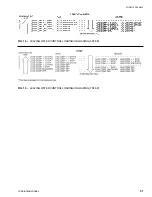
FORM 150.60-NM4
YORK INTERNATIONAL
41
SELECTION OF RETURN OR LEAVING CHILLED LIQUID CONTROL
GENERAL
The user has the ability to select the type of chilled liq-
uid temperature control by choosing either Return or Leav-
ing Temperature Control. This provides the ability to fine
tune the method of control for comfort cooling or batch/
process cooling loads.
In many cases, comfort cooling will be best controlled
by RETURN WATER CONTROL. This will assure a mini-
mum of cycling compressors/loaders with stable leaving
chilled liquid temperatures as long as water flow GPM is
held constant and the Control Range (CR) is correctly
programmed.
LEAVING WATER CONTROL is also suitable for com-
fort cooling, but may produce slightly more cycling de-
pending upon the RATE SENSITIVITY programmed.
Optional stages of loading are recommended to reduce
cycling. In most cases, Leaving Water Control will be
more precise unless compressor cycling is encountered.
“Anticipation” and timers are built into the microproces-
sor’s control algorithms to eliminate compressor and
loader cycling enabling LEAVING WATER CONTROL to
be used in most applications. The control algorithm uti-
lizes “PID” control.
For batch and process applications, LEAVING WATER
CONTROL will allow for precise temperature control. In
these applications chilled liquid temperature control is
more important than compressor/loader cycling. When
LEAVING WATER CONTROL is utilized, it is recom-
mended to have optional steps of loading on each com-
pressor. This assures minimum tonnage per step which
reduces the possibility of compressor and loader cycling
that is critical to precisely controlling temperature.
If an error is made while programming, press CANCEL.
This will clear all programmed (*) “holiday” days. The
schedule can then be reprogrammed.
The “0” key will not cancel out a “*” and cannot be used
for correcting a programming error.
Manual Override
When the MANUAL OVERRIDE key is pressed, the Daily
Schedule programmed into the chiller will be ignored and
the chiller will start-up when water temperature allows,
unit switch permits, and system switches permit.
Normally this key is not used unless an emergency forces
the chiller to require operation during a period where the
programmed Daily Schedule is calling for the chiller to
be OFF (Daily Schedule Shutdown).
Once activated, MANUAL OVERRIDE is only active for
a period of 30 minutes. It is for servicing only and is
designed so that if let on accidentally, the microproces-
sor will automatically return to the Daily Schedule.
MANUAL
OVERRIDE
M A N U A L
O V E R R I D E
RETURN WATER CONTROL may also be used on batch
and process application and should provide adequate
control. However, it will prove to be less responsive with
slightly more leaving chilled liquid temperature variation.
RETURN WATER CONTROL may become necessary
to use if too much compressor cycling is noted with cor-
responding water temperature fluctuation when in Leav-
ing Water Control.
After determining the mode of control best suited for the
application (RETURN OR LEAVING WATER CONTROL),
the micro panel must be interrogated to determine whether
it is programmed for RETURN or LEAVING WATER
CONTROL. This can be accomplished by pressing the
OPTION key in the DISPLAY section of the keypad. This
allows the user to determine the present mode of control
without gaining access to the Microprocessor Board and
visually checking the sometimes difficult to determine
Dip Switch position. When the OPTION key is pressed,
a message
“THE FOLLOWING ARE PROGRAMMED”
will appear on the display for 3 seconds. The display will
then scroll through the 8 dip switch selections, each
appearing for 3 seconds. The 4th display will tell the
user whether leaving or return temperature is programmed
on Switch 4. The 4th display message will read either
“RETURN WATER CONTROL” or “LEAVING WATER
CONTROL” and will appear for 3 seconds. The display
will then scroll through the 8 dip switch selections, each
appearing for 3 seconds.
If a change is required, position Switch #4 on dip switch
S1 on the Microprocessor Board (Fig. 12) as indicated:
RWT CONTROL: SW 4 OPEN
(left side pushed down)
LWT CONTROL: SW 4 CLOSED
(right side pushed down)
















































